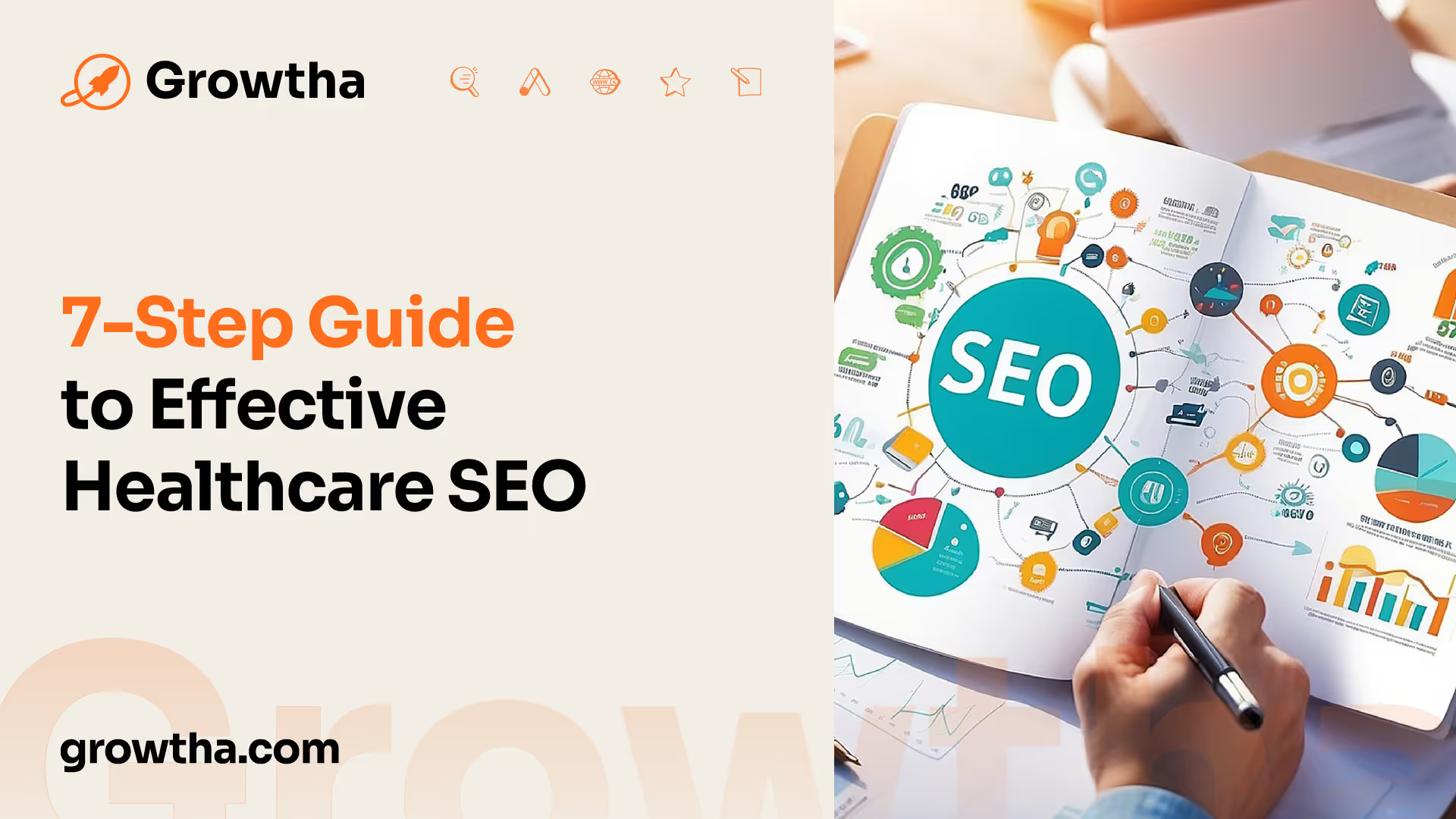7-Step Guide to Effective Healthcare SEO
With the easy accessibility of information online, healthcare providers must establish a strong online presence to effectively engage with potential patients.


7-Step Guide to Effective Healthcare SEO
The Importance of Healthcare SEO
In the digital era, the healthcare industry recognizes the significant role of search engine optimization (SEO) in enhancing online visibility and reaching a broader audience [1]. With the easy accessibility of information online, healthcare providers must establish a strong online presence to effectively engage with potential patients.
Enhancing Online Visibility
A recent study reveals that 77% of individuals initiate their patient journey by using search engines, highlighting the importance of a robust online presence for healthcare organizations [2]. By implementing effective SEO strategies, healthcare providers can improve their website's visibility in search engine results pages (SERPs). This increased visibility allows healthcare organizations to reach individuals actively seeking healthcare information, services, or providers.
By optimizing their websites with relevant keywords, meta tags, and other SEO techniques, healthcare providers can improve their organic rankings in search results. This increased visibility helps attract potential patients, leading to a higher likelihood of website visits, inquiries, and ultimately, conversions.
Reaching and Assisting a Broader Audience
Healthcare SEO allows organizations to reach and assist a broader audience by providing valuable and informative content. By understanding the needs and concerns of potential patients, healthcare providers can create content that resonates with their target audience. This content can address common health questions, provide educational resources, and offer guidance on various medical conditions or treatments.
By developing a comprehensive content strategy that focuses on patient education, healthcare organizations can build trust and establish themselves as authorities in their respective fields. This educational approach helps potential patients make informed decisions about their healthcare, leading to improved patient satisfaction and trust in the healthcare provider [2].
Additionally, effective healthcare SEO strategies can help healthcare organizations expand their reach beyond traditional geographic boundaries. With the increasing popularity of telemedicine and online healthcare services, healthcare providers can connect with patients from different regions, allowing them to provide specialized care to a broader audience.
By embracing healthcare SEO, organizations can enhance their online visibility, attract a larger audience, and establish themselves as trusted resources in the healthcare industry. This approach not only generates leads and patients at a lower cost compared to running ads but also allows healthcare providers to educate and assist potential and current patients effectively.
The 7-Step Guide to Effective Healthcare SEO
To optimize a healthcare website's online presence and improve its visibility in search engine results, following a comprehensive 7-step guide to healthcare SEO is essential. By implementing these steps, healthcare providers can enhance their digital marketing efforts and attract a broader audience of patients. Let's explore each step in detail:
Step 1: Conducting Thorough Keyword Research
Conducting thorough keyword research is the foundation of a successful healthcare SEO strategy. It involves identifying relevant keywords and phrases that patients are searching for online. Keyword research tools like SEMrush, Google Keyword Planner, or Ahrefs can help healthcare providers identify these keywords and understand patient search behavior [3].
Step 2: Creating Unique and Valuable Content
Creating unique and valuable content is crucial for healthcare websites. By answering patients' questions and providing valuable information, healthcare providers can improve their website's visibility and credibility. High-quality content that addresses patient needs can also enhance user experience and encourage engagement. This step helps establish healthcare providers as trusted sources of information.
Step 3: Optimizing On-Page Elements
Optimizing on-page elements is vital for healthcare SEO. This includes optimizing title tags, meta descriptions, headers, and other HTML elements to incorporate relevant keywords. By optimizing these elements, healthcare providers can improve search engine understanding of their website's content and increase its visibility in search results [3].
Step 4: Building High-Quality Backlinks
Building high-quality backlinks from reputable websites is crucial for improving the authority and trustworthiness of a healthcare website. Backlinks act as endorsements from other sites, signaling to search engines that the healthcare site is trustworthy and relevant. This step positively impacts search engine rankings and visibility [3].
Step 5: Claiming and Optimizing Directory Listings
Claiming and optimizing directory listings is essential for local SEO and improving online visibility. Healthcare providers should claim their listings on popular directories like Google My Business, Yelp, and Healthgrades. Optimizing these listings with accurate and up-to-date information helps patients find the healthcare provider's services more easily.
Step 6: Engaging in Local SEO Strategies
Engaging in local SEO strategies is crucial for healthcare providers serving specific geographic areas. This step involves optimizing website content with local keywords, creating location-specific landing pages, and obtaining local citations. By focusing on local SEO, healthcare providers can attract patients from their target regions [4].
Step 7: Implementing Google Ads Campaigns
Implementing Google Ads campaigns complements healthcare SEO efforts and helps increase visibility, drive traffic, and convert leads into patients. By running targeted ads on Google, healthcare providers can appear prominently in search results and attract potential patients. This step enhances overall marketing efforts and increases the chances of converting website visitors into patients.
By following this 7-step guide, healthcare providers can effectively optimize their online presence, improve search engine rankings, and attract a broader audience of patients. It's important to regularly monitor and adjust the SEO strategy to ensure ongoing success in the ever-evolving digital landscape.
Supporting Healthcare SEO Efforts
To maximize the effectiveness of healthcare SEO strategies, it is essential to support these efforts with various additional tactics. Social media engagement, content marketing, and regular website updates play vital roles in creating a well-rounded digital presence and improving search engine rankings.

Social Media Engagement
Engaging with patients and potential clients through social media platforms is a powerful way to enhance healthcare SEO. By actively participating in conversations, sharing valuable content, and responding to inquiries, healthcare providers can establish themselves as trusted authorities in their respective fields. Social media platforms also provide an opportunity to share links to relevant content, driving traffic back to the website.
It's important to choose the right social media channels that align with the target audience's preferences and habits. Regularly posting informative and engaging content, such as health tips, industry news, and patient success stories, can help foster a sense of community and increase brand visibility. Additionally, utilizing relevant hashtags and encouraging user-generated content can expand reach and engagement.
Content Marketing
Content marketing is a fundamental component of effective healthcare SEO. By creating and sharing unique, valuable, and relevant content, healthcare providers can establish their expertise, build trust with their audience, and improve organic traffic and search engine rankings.
A well-planned content strategy involves a team of writers, editors, subject matter experts, designers, and web developers who work together to deliver content that increases brand awareness, engagement, conversions, and patient satisfaction while considering SEO and healthcare marketing best practices. This collaborative effort ensures that the content resonates with the target audience and provides valuable information.
Content marketing in the healthcare industry involves creating content in various formats, such as blog articles, videos, infographics, and podcasts. These formats cater to different preferences and enable healthcare providers to reach a broader audience. Additionally, optimizing content with relevant keywords, headings, and meta tags can enhance its visibility in search engine results.
Regular Website Updates
Regularly updating the website is crucial for maintaining a strong online presence and improving healthcare SEO. Search engines value fresh and relevant content, and frequent updates signal that the website is active and provides up-to-date information.
Website updates can involve adding new blog posts, updating existing content, incorporating patient testimonials, and providing information about new treatments or services. It's essential to ensure that all content is optimized for search engines, including relevant keywords, meta descriptions, and internal links.
Regularly reviewing and improving the website's technical aspects, such as page load speed, mobile responsiveness, and user experience, also contribute to a positive SEO impact. Search engines prioritize websites that provide a seamless and user-friendly browsing experience.
By supporting healthcare SEO efforts through social media engagement, content marketing, and regular website updates, healthcare providers can strengthen their online presence, attract a larger audience, and demonstrate their expertise in the field. These strategies work together to create a comprehensive digital marketing approach that drives organic traffic, engages patients, and improves search engine rankings.

The Role of Digital Marketing Agencies
When it comes to implementing effective healthcare SEO strategies, digital marketing agencies specializing in healthcare SEO can provide valuable expertise and support. These agencies have a deep understanding of the healthcare industry and the unique challenges faced by health systems in the digital landscape. Their role in healthcare SEO is twofold: providing expertise and support, as well as delivering measurable digital marketing efforts.
Expertise and Support for Healthcare SEO
Digital marketing agencies bring a wealth of knowledge and experience to the table when it comes to healthcare SEO. They understand the intricacies of optimizing healthcare websites, conducting thorough keyword research, and developing content strategies that align with the goals of health systems. With their expertise, these agencies can help health systems enhance their online visibility, attract more patients, and secure long-term success.
One of the key areas where digital marketing agencies excel is content marketing. Expert healthcare content marketing requires deep industry knowledge to establish a brand's expertise, authority, and trust through data-driven strategy, specialized content creation, and multi-channel distribution. Agencies like Healthcare Success provide assistance in creating an effective content strategy, increasing organic traffic, engagement, and creating a better patient experience through measurable digital marketing efforts [5].
Digital marketing agencies also play a crucial role during the content creation phase by providing on-page and technical SEO guidance, tracking content performance, conducting analysis, and fine-tuning strategies to meet medical content marketing goals [5]. Their expertise ensures that healthcare websites are optimized for search engines, making it easier for potential patients to find the information they need.
Measurable Digital Marketing Efforts
In addition to providing expertise and support, digital marketing agencies deliver measurable digital marketing efforts. They use tools and analytics to track the performance of healthcare SEO strategies, monitor website traffic, engagement metrics, and conversions. This data-driven approach allows health systems to understand the effectiveness of their SEO efforts and make informed decisions for continuous improvement.
By leveraging the expertise of digital marketing agencies, health systems can benefit from targeted SEO strategies, optimized content, and ongoing support to achieve their marketing goals. These agencies play a pivotal role in helping health systems navigate the complex world of healthcare SEO, ensuring that their online presence is strong, their messaging is effective, and their patient base continues to grow.
Establishing Expertise and Trust
When it comes to healthcare SEO, establishing expertise and trust is vital for the success of any healthcare website. By demonstrating industry expertise and building trust with the audience, healthcare websites can improve their rankings on search engines and attract more visitors. Two essential strategies for establishing expertise and trust are providing author details and accreditations, as well as interlinking web pages.
Author Details and Accreditations
To establish expertise and trust, healthcare websites should provide detailed information about the authors of their content, including their qualifications, experience, and accreditations. This information helps build credibility and reassures visitors that the content is reliable and trustworthy. By showcasing the expertise and credentials of the authors, healthcare websites can instill confidence in the audience and increase their chances of ranking higher in search engine results.
Including author details and accreditations can be particularly beneficial for medical content, as it demonstrates that the information provided is backed by professionals in the field. Visitors are more likely to trust content written by experts, which can lead to increased engagement and conversions.
Interlinking Web Pages
Interlinking web pages within a healthcare website is another important aspect of establishing expertise and trust. Interlinking refers to the practice of linking relevant pages within the same website. This technique enhances navigation, improves user experience, and helps search engines understand the structure and hierarchy of the website.
By interlinking web pages, healthcare websites can distribute link equity throughout the site, improving the visibility and ranking of each page. A robust interlinking structure also promotes engagement by guiding visitors to related and valuable content. This can increase the time spent on the website and reduce bounce rates, which are positive signals for search engines.
To implement effective interlinking, healthcare websites should consider the relevance and context of the linked pages. By strategically linking related content, websites can create a cohesive user experience and guide visitors to explore more information.
By implementing these strategies of providing author details and accreditations, as well as interlinking web pages, healthcare websites can enhance their expertise, authority, and trustworthiness. This not only improves the website's ranking on search engines but also fosters a positive user experience, leading to increased engagement and conversions. It is important to work with SEO experts and a team of content creators to ensure that these strategies align with healthcare marketing best practices and drive the desired results.
Measuring and Tracking SEO Success
To gauge the effectiveness of a healthcare SEO strategy, it is essential to measure and track key metrics. By monitoring these metrics, healthcare providers can assess the impact of their SEO efforts and make informed decisions to improve their online presence. This section will discuss the key metrics to monitor and the tools available for performance tracking.
Key Metrics to Monitor
- Organic Traffic: Tracking organic traffic is crucial for evaluating the success of healthcare SEO strategies. It measures the number of visitors who land on a website through organic search engine results. Analyzing organic traffic provides insights into the effectiveness of keyword targeting and content optimization.
- Keyword Rankings: Monitoring keyword rankings allows healthcare providers to understand how their website is performing in search engine results pages (SERPs). By tracking the rankings of relevant keywords, providers can assess their visibility and make necessary adjustments to improve rankings.
- User Engagement: User engagement metrics, such as bounce rate, time on page, and pages per session, provide insights into how visitors interact with the website. Monitoring these metrics helps identify areas of improvement in terms of content relevance, user experience, and overall website performance.
- Conversion Rate: Conversion rate measures the percentage of website visitors who take a desired action, such as making an appointment or downloading a resource. Tracking conversion rates helps assess the effectiveness of the website in converting visitors into valuable leads or patients.
Tools for Performance Tracking
Several tools are available to measure and track the success of healthcare SEO efforts. Here are some commonly used tools:
- Google Analytics: Google Analytics provides comprehensive insights into website performance, including organic traffic, user engagement, conversion rates, and more. It offers valuable data to evaluate the effectiveness of SEO strategies and make data-driven decisions.
- Google Search Console: Google Search Console offers valuable information about a website's presence in Google search results. It provides data on keyword rankings, click-through rates, and allows for monitoring indexing issues and website health.
- SEMrush: SEMrush is an all-in-one SEO toolkit that offers a range of features to track SEO performance. It provides data on organic traffic, keyword rankings, backlinks, and helps identify opportunities for improvement.
- Moz Pro: Moz Pro offers a suite of SEO tools that assist in tracking keyword rankings, analyzing website performance, and monitoring backlinks. It provides valuable insights to optimize SEO strategies.
- Ahrefs: Ahrefs is a comprehensive SEO tool that offers features to track keyword rankings, analyze backlinks, and monitor competitors. It provides valuable data to improve SEO performance and stay ahead in the competitive landscape.
By utilizing these tools, healthcare providers can gain valuable insights into their SEO performance and make informed decisions to optimize their strategies. Regular monitoring and analysis of key metrics are crucial for ongoing improvement and achieving long-term success in healthcare SEO.
References
[2]: https://www.linkedin.com/pulse/complete-playbook-healthcare-seo-flying-v-group
[3]: https://www.semrush.com/blog/healthcare-seo/
[4]: https://digitalismedical.com/blog/healthcare-seo-strategy/
[5]: https://healthcaresuccess.com/marketing-services/content-marketing







